Mercedes C Class Sedan vs Vauxhall Astra - Differences and prices compared
Compare performance (680 HP vs 225 HP), boot space and price (41200 £ vs 25200 £ ) at a glance. Find out which car is the better choice for you – Mercedes C Class Sedan or Vauxhall Astra?
Costs and Efficiency:
Price and efficiency are key factors when choosing a car – and this is often where the real differences emerge.
Vauxhall Astra has a decisively advantage in terms of price – it starts at 25200 £ , while the Mercedes C Class Sedan costs 41200 £ . That’s a price difference of around 15975 £.
Fuel consumption also shows a difference: Mercedes C Class Sedan manages with 1.60 L and is therefore clearly perceptible more efficient than the Vauxhall Astra with 2.20 L. The difference is about 0.60 L per 100 km.
As for electric range, the Vauxhall Astra performs clearly better – achieving up to 419 km, about 302 km more than the Mercedes C Class Sedan.
Engine and Performance:
Under the bonnet, it becomes clear which model is tuned for sportiness and which one takes the lead when you hit the accelerator.
When it comes to engine power, the Mercedes C Class Sedan has a convincingly edge – offering 680 HP compared to 225 HP. That’s roughly 455 HP more horsepower.
In acceleration from 0 to 100 km/h, the Mercedes C Class Sedan is convincingly quicker – completing the sprint in 3.40 s, while the Vauxhall Astra takes 7.50 s. That’s about 4.10 s faster.
In terms of top speed, the Mercedes C Class Sedan performs somewhat better – reaching 280 km/h, while the Vauxhall Astra tops out at 235 km/h. The difference is around 45 km/h.
There’s also a difference in torque: Mercedes C Class Sedan pulls decisively stronger with 1020 Nm compared to 360 Nm. That’s about 660 Nm difference.
Space and Everyday Use:
Cabin size, boot volume and payload all play a role in everyday practicality. Here, comfort and flexibility make the difference.
Both vehicles offer seating for 5 people.
In curb weight, Vauxhall Astra is evident lighter – 1341 kg compared to 1695 kg. The difference is around 354 kg.
In terms of boot space, the Mercedes C Class Sedan offers minimal more room – 455 L compared to 422 L. That’s a difference of about 33 L.
When it comes to payload, Mercedes C Class Sedan to a small extent takes the win – 570 kg compared to 509 kg. That’s a difference of about 61 kg.
Who wins the race?
The Mercedes C Class Sedan proves to be outperforms in nearly all aspects and therefore becomes our DriveDuel Champion!
Mercedes C Class Sedan is the better all-rounder in this comparison.
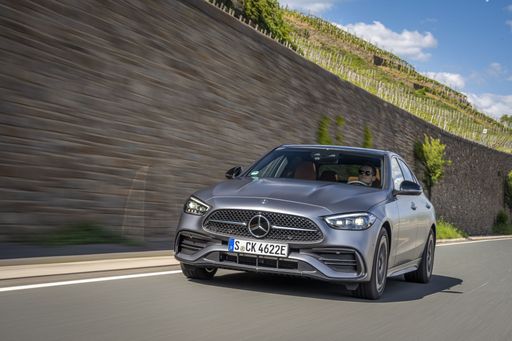
Mercedes C Class Sedan
Costs and Consumption
View detailed analysis
Engine and Performance
View detailed analysis
Dimensions and Body
View detailed analysis
Mercedes C Class Sedan
The Mercedes C‑Class is the compact executive that dresses like it owns the boulevard, with an interior that blends modern elegance and plush comfort to make everyday driving feel unexpectedly special. On the road it pairs poise with a hint of cheeky agility, rewarding drivers who want refinement without forfeiting a touch of fun — and yes, it still looks great in the driveway.
details
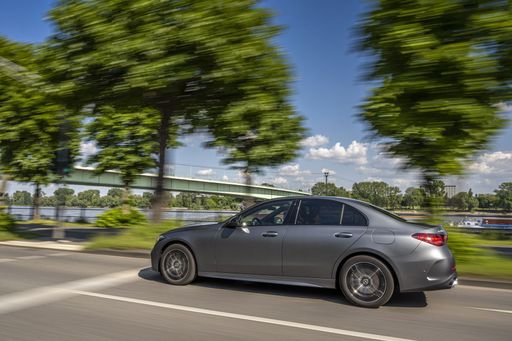
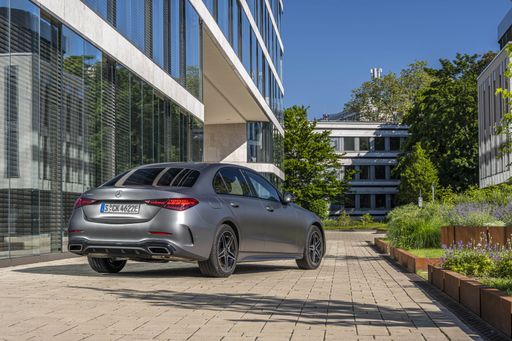
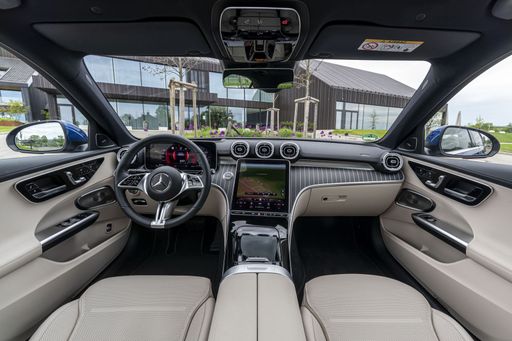
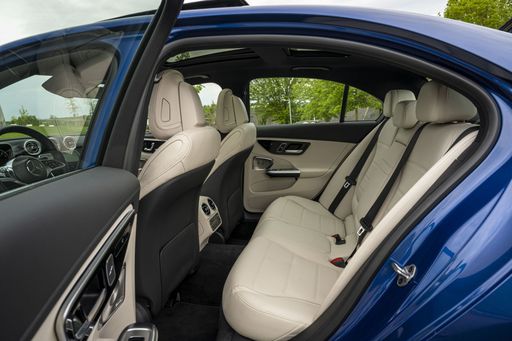
Vauxhall Astra
The Opel Astra strikes a neat balance between everyday practicality and engaging handling, so the daily grind suddenly feels a bit less dull. Inside it's intelligently packaged with modern kit and comfortable seating, making it a very sensible pick for buyers who want a dependable hatchback that doesn't take itself too seriously.
details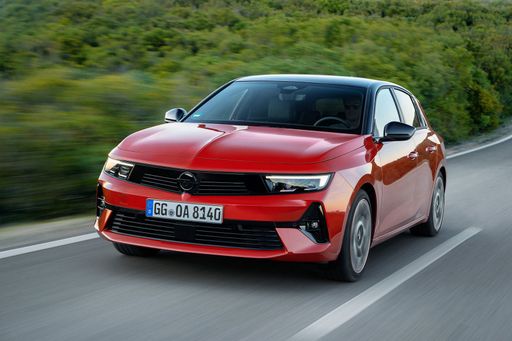

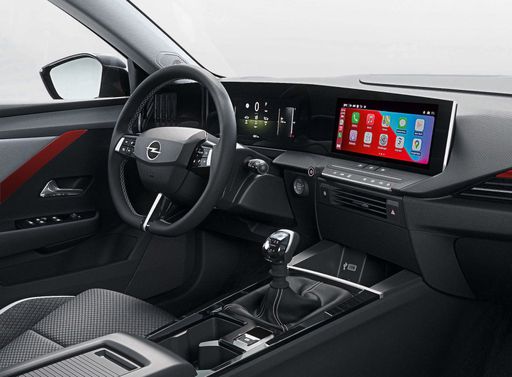
Costs and Consumption |
|
|---|---|
|
Price
41200 - 103100 £
|
Price
25200 - 40500 £
|
|
Consumption L/100km
1.6 - 9 L
|
Consumption L/100km
2.2 - 6 L
|
|
Consumption kWh/100km
-
|
Consumption kWh/100km
15.40 kWh
|
|
Electric Range
11 - 117 km
|
Electric Range
82 - 419 km
|
|
Battery Capacity
19.50 kWh
|
Battery Capacity
51 kWh
|
|
co2
41 - 205 g/km
|
co2
0 - 135 g/km
|
|
Fuel tank capacity
40 - 66 L
|
Fuel tank capacity
42 - 52 L
|
Dimensions and Body |
|
|---|---|
|
Body Type
Sedan
|
Body Type
Hatchback
|
|
Seats
5
|
Seats
5
|
|
Doors
4
|
Doors
5
|
|
Curb weight
1695 - 2195 kg
|
Curb weight
1341 - 1736 kg
|
|
Trunk capacity
280 - 455 L
|
Trunk capacity
352 - 422 L
|
|
Length
4751 - 4842 mm
|
Length
4374 mm
|
|
Width
1820 - 1900 mm
|
Width
1860 mm
|
|
Height
1438 - 1458 mm
|
Height
1432 - 1488 mm
|
|
Max trunk capacity
-
|
Max trunk capacity
1268 - 1339 L
|
|
Payload
480 - 570 kg
|
Payload
414 - 509 kg
|
Engine and Performance |
|
|---|---|
|
Engine Type
Petrol MHEV, Plugin Hybrid, Diesel MHEV
|
Engine Type
Petrol, Diesel, Electric, Petrol MHEV, Plugin Hybrid
|
|
Transmission
Automatic
|
Transmission
Manuel, Automatic
|
|
Transmission Detail
Automatic Gearbox
|
Transmission Detail
Manual Gearbox, Automatic Gearbox, Reduction Gearbox, Dual-Clutch Automatic
|
|
Drive Type
Rear-Wheel Drive, All-Wheel Drive
|
Drive Type
Front-Wheel Drive
|
|
Power HP
183 - 680 HP
|
Power HP
130 - 225 HP
|
|
Acceleration 0-100km/h
3.4 - 8.6 s
|
Acceleration 0-100km/h
7.5 - 10.6 s
|
|
Max Speed
230 - 280 km/h
|
Max Speed
170 - 235 km/h
|
|
Torque
250 - 1020 Nm
|
Torque
230 - 360 Nm
|
|
Number of Cylinders
4
|
Number of Cylinders
3 - 4
|
|
Power kW
135 - 500 kW
|
Power kW
96 - 165 kW
|
|
Engine capacity
1496 - 1999 cm3
|
Engine capacity
1199 - 1598 cm3
|
General |
|
|---|---|
|
Model Year
2024 - 2025
|
Model Year
2023 - 2025
|
|
CO2 Efficiency Class
E, B, D, G
|
CO2 Efficiency Class
D, A, C, B
|
|
Brand
Mercedes-Benz
|
Brand
Vauxhall
|
Is the Mercedes C Class Sedan offered with different drivetrains?
The Mercedes C Class Sedan is offered with Rear-Wheel Drive or All-Wheel Drive.




